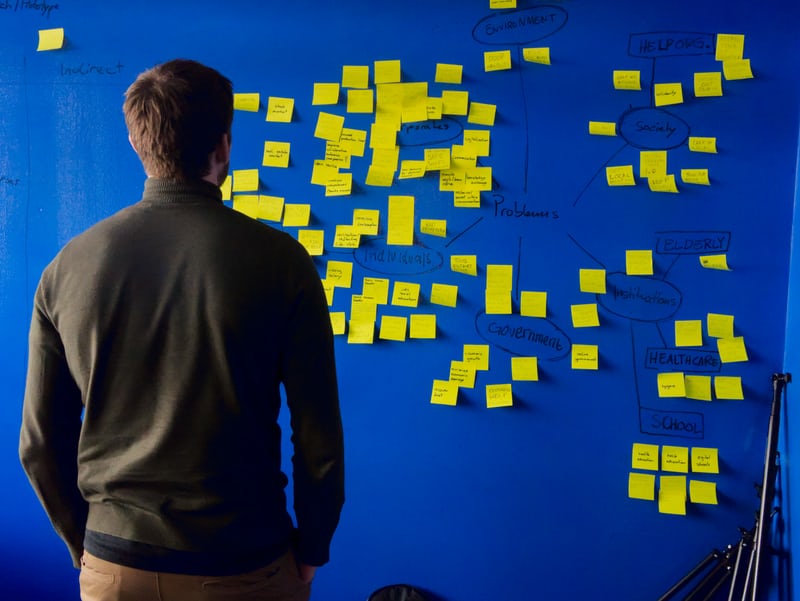During suboptimal times, working harder and longer is favorable. Plus with tax hikes, soaring asset prices, and extra time at home, not taking advantage of these perks is a poor move.
The covid pandemic allowed us to reconsider our livelihood and how we spend 80% of our waking hours at work. Today there are a staggering 582 million entrepreneurs worldwide!
In the U.S. this number is close to 31 million. Following the solo route is marketed as the fastest path towards success, defined differently by everyone, but in hindsight, it can actually be the most painful, draining, and time and money waster. The self-made businessman and woman have become a top consideration these days yet less than 10% actually make it through.
Although working for thyself isn’t preferred by everyone, it is becoming more popular than ever. With stubborn unemployment, high levels of job openings, and picky earners, people finally get to choose where, how, and when they want to work taking charge of the Great Resignation or as some like to call it, the Great Realignment.
The wave of entrepreneurship took flight this year and it was proven in the record number of IPOs and SPACs. Surpassing 2020’s record of 480 IPOS, 2021 hit 1056 IPOs and counting. Some of our favorite overpriced health brands such as Chobani, Oatley, and Sweetgreen have and or have filed to go public along with retailers from Warby Parker to Rent the Runway and Allbirds.

All-Around
There are distinct similarities behind these iconic mega brands and the majority of companies that went public or redid their public debut through a SPAC (blank-check company acquisition) for a second time, such as WeWork. A major distinction is that the founders are from abroad.
They migrated to the states and fled to coastal locations such as NYC, Washington State, and San Francisco. Without them, the U.S. would not be a global powerhouse and the most innovative capital of the world. Despite a ban on travel with lockdown mandates in 2020 into 2021, this hasn’t stopped current immigrants who settled right before covid from building their first unicorn and creating a better life for themselves.
After all, a major benefit of immigration is entrepreneurship.
As a child of immigrants, I’ve been raised in a family that prioritizes these qualities, traits, and ideals.
They all resemble entrepreneurial thinking:
-Being appreciative and grateful for every opportunity
-Never quit until you are PROUD
-Learning and embracing setbacks, challenges, and hardship
-Never stay complacent
-Learning to listen to everyone and be diplomatic
-Know if we have nothing nice to say don’t say it and it’s better to keep our mouth shut than open
-Work ethic, patience, stoicism, dedication, consistency, and people skills > talent, IQ, grades
-Listening will teach you more than learning
-Patience is a virtue
-Working for someone will never make you free
-Living below your means is a rich lifestyle
-Being frugal and living the stealth wealth lifestyle is always recommended
-There’s no better feeling than earning on your own by investing in yourself through your own sweat and tears
Immigrants are the lifeblood of this country. Without them, I have to say and I hope Americans realize this as well, we would certainly not be the wealthiest nor technologically advanced, innovative, and prosperous country. Immigrants should get major credit.
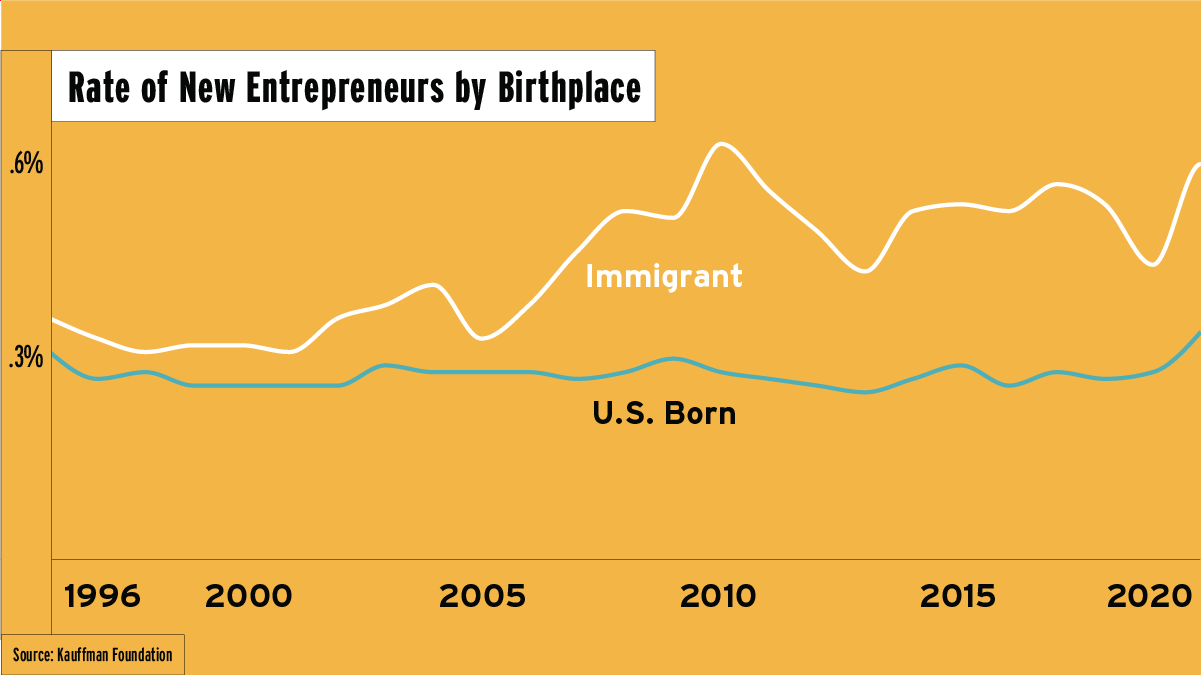
Although inside it doesn’t look like an incredibly prosperous, resourceful country, to the rest of the world, it sure is, and that’s the reason people flock here year after year. The American Dream is alive and requires work but is already an advantage if you have the luxury to come here which these immigrants already have.
Despite lockdowns, unemployment, mandates, political turmoil, entrepreneurship has been at an all-time high since the end of 2019. The pandemic allowed people, those fortunate enough to spend extra time at home, a.k.a the laptop class, read here who they are, to take the time to reassess their lifestyle, work-life balance, career aspirations, lifestyle, earnings potential, and meaning of life. Sounds deep but those who capitalized on it and didn’t waste a second were immigrants after all. They did not slow down only sped up. The ultimate regret is regret itself and with ‘extra’ time from the pandemic, immigrants got to work the most.
NYC is known as a melting pot. Having been born and raised here, this city never gets old. There’s not only something new to see every day, but someone to meet and learn from. You have to be a curious creature or else might as well move to the suburbs where it’s possible to not see a single soul for a week. People aren’t as scary as you may think. Any big city seems overwhelming until you get down to the streets and start a conversation with someone. You then realize everyone is in the same boat. Lonely and purposeless. We’re all in this together. We are not alone despite living in one of the loneliest cities in the world.
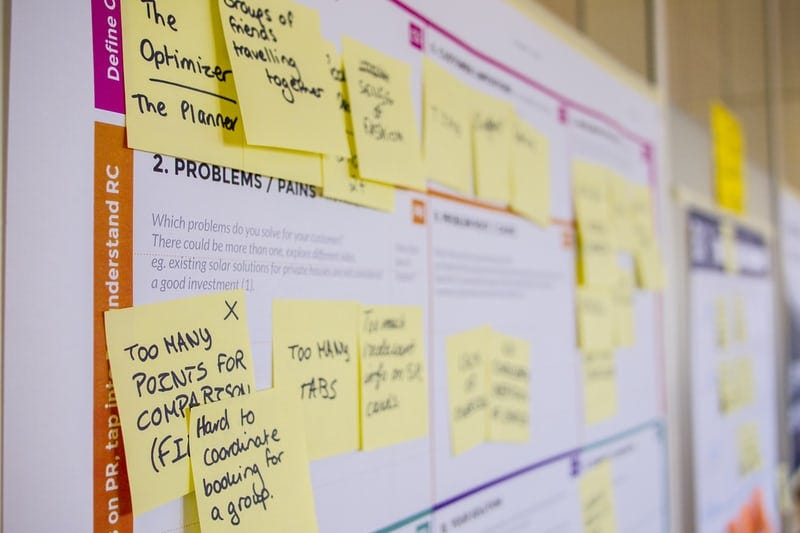
By You
Immigrants are the foundation of this country. The majority of Fortune 500 companies were founded by immigrants. 56% of the CEOS come from 28 different countries and over 10.5% of the immigrant workforce owns a business compared to 9.3% of the non-immigrant, U.S. native workforce.
Immigrants have unique perseverance and style. Since they’ve taken a huge leap of faith and migrated her in the first place, they know a thing or two about perseverance, risk-taking, and starting from scratch. They aren’t here to stay comfortable. They are here to make a difference. They didn’t inherit a lump sum so they better get down and dirty.
They become comfortable with the uncomfortable and take no for an answer. The hospitality, restaurant, entertainment, and startup space are notoriously volatile business ventures.
Over 90% of startups fail yet immigrants prefer this type of work. It gives them adrenaline since they have an initial goal to fulfill beyond the 9–5. Although technology offers less or more the same opportunities globally, with the networking base, institutions, cultural hub, capital, and freedom, immigrants flock and desire to come here even though it has been harder than ever for the bottom 90% to become millionaires and instead the top 1% end up becoming billionaires. Yet that clearly hasn’t stopped them even during a deadly pandemic.
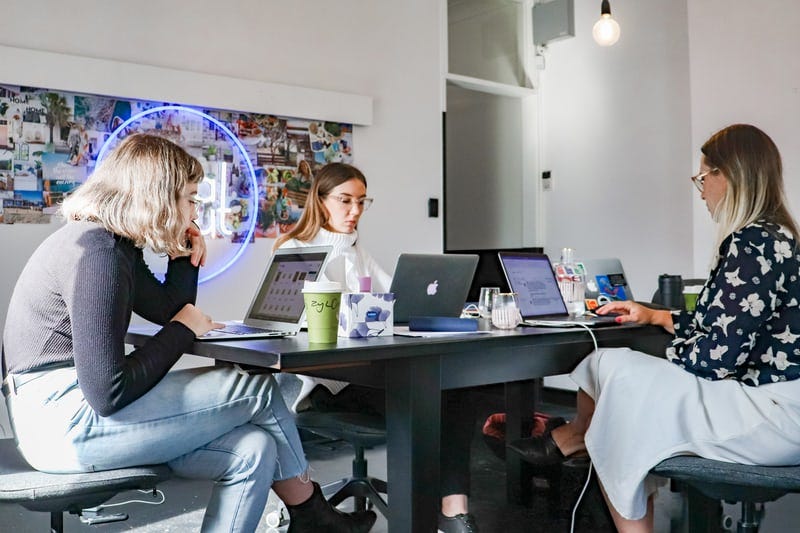
Come and Stay
80% of immigrants are more likely to start a business than Americans. To be clear, a business doesn’t have to entail the next publicly traded unicorn. It could simply mean a food truck, blog, app, or charity. They have a self-starter mindset that I’m always fascinated by.
Immigrant-founded firms create 42% more jobs than native-born firms yet only make up a sixth of the American workforce. Their first task coming to the U.S. is to learn English. This is usually done in their native country through school or on the side since they believe and studies have proven that English proficiency and earnings are tightly correlated.
It’s important to note that although there are more immigrant founders of unicorns, Fortune 500 companies, Michelin star restaurants, and CEOs, immigrants that migrate to the U.S. overseas, not by foot through Mexico or surrounding land, are well-off to start with.
Certainly not all but in order to come and stay afloat before starting a business and life in pricey USA, you have to be stable financially. As immigrants know all too well, everything takes time, especially a passport, documentation, and residency to reside and stay here.
A business is another milestone that doesn’t come easy and has a high failure rate but immigrants are willing to comprise anything for it. To flee to any metropolitan city such as NYC, Miami, or San Francisco where the average median home price is in the 7 figure range along with a top 10% income to be considered ‘middle class’ takes a hefty allowance, inheritance, and several income sources to stay afloat. Certainly, not all immigrants have this support from the start but many who do come here already have a leg up. There’s no denying it. It’s just a fact. The U.S. isn’t cheap, just the land which is why foreigners are bidding it as well.

Transport
A supportive financial backing and buffer have allowed immigrants to pursue new ventures at exceptionally high rates for decades. This increasing trend has ramped up in the mid-2000s during the dot-com bubble. Silicon Valley became a popular hub back then to experiment with ventures, many of which don’t exist today due to their lofty valuations hit during the crash in 2000. Many aspiring engineers, creators, college dropouts, and visionaries would gather on the campus from across the globe.
Today, big-name tech firms such as Adobe, Twitter, Microsoft, and Google are all run by people of South Asian descent. Sure, rags to riches stories do exist and have happened. Luck exists everywhere. The more you do, the more opportunities are naturally presented but it seems as if the rags to riches story whether it be for Jennifer Lopez or Cardi B growing up in the Bronx now global superstars, born and raised Americans are more likely to witness it than immigrants themselves.
I believe success = preparation + opportunity. Eventually, through unwavering commitment, consistency, and dedication, something will happen. Even if you don’t change nor have any special talent or skill, over time, something must evolve and you must be found.
No wonder 90% of creators quit within a few months with a few pieces of published content. They aren’t willing to ride the waves, deal with the uncertainty, have patience, and don’t believe in themselves. That is the opposite mentality an immigrant must possess or else they will have an increasingly hard time getting by. What if success was as easy as continuing? Many are still not convinced.
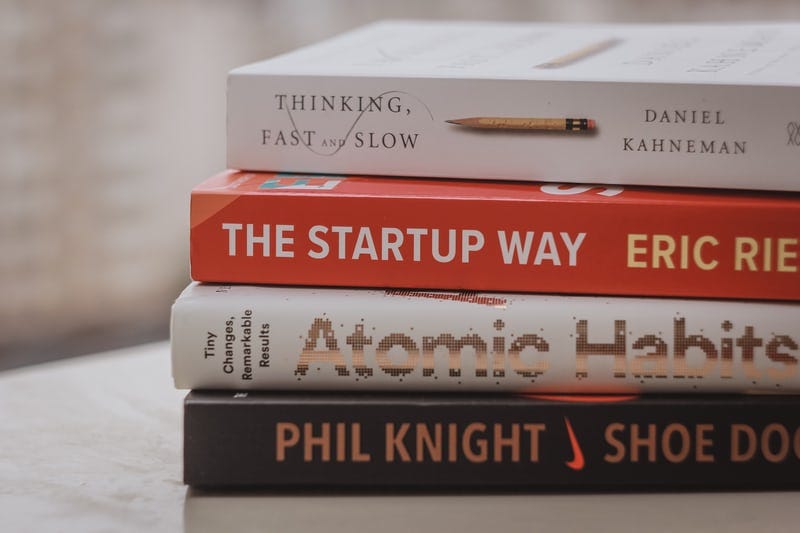
Safe or Stay
Past the dot-com bubble in the mid-2000s, immigrants fled to Silicon Valley and instead of pouring their capital into unprofitable frothy stocks, they fled to start profitable, realistic companies and drop out of college. Institutionalized education is a highly debated topic.
There’s no right or wrong answer but to immigrants, it’s usually a strong yes or strong no, rarely in the middle. They certainly prefer security and want to stay on the sturdy reliable path with a degree, an economic premium that cannot be replaced yet at the same time, they are risk-averse, adventurous, curious, different, and mentally tough top qualities for an entrepreneur. After all, traveling to an unknown country is already a venture in itself.
Gig Economy and Freelancing
Fast forward to today, in 2020, 6 out of every 1,000 immigrants started a new business.
That’s almost double the rate of people born in the U.S!
Think about a CEO you admire. Chances are, they are from another country. If it’s Zuck, Bezos, or Dorsey, think bigger and better. Choose a visionary, not an addictive tobacco social media or monopoly. Musk to Branson, Nadella to Pichai grew up outside of the U.S., and through a bit of luck, timing, and finding the right people at the right time, they were able to take on high positions and start companies that the world was powered by. Yes, some of your inspirations did go to school and obtain a degree as well. Knowing how to program is a massive advantage as well.
Although the wave of entrepreneurship kicked off in the early 2000s when I was born, it’s seen a massive wave during the pandemic as WFH, freelancing, e-commerce, EV, investing, the creator economy, gig economy, and influencing have all come about. Working for thyself is more appealing than ever. People are establishing a different lifestyle and aren’t afraid to state they are solo entrepreneurs. But the downsides sometimes weigh out the costs. Many of them include loneliness, unstable income for a while, and massive internal motivation needed. Having a side-hustle will help balance out this trepidation and help you test out the waters before jumping into it full-time Although pay is unpredictable in the creator economy, it’s freeing, and more than ever people are valuing their time, mental health, and sanity as we are living digital lives.
The pandemic helped end a multidecade slump in new start-ups that had both stumped and worried economists. The NY Times found, “This year, business applications in the U.S. are on track to surpass 5.4 million, up from 4.3 million last year. And so far, at least, the economy’s reopening doesn’t seem to be pulling people away from entrepreneurship — the share of workers reporting they were self-employed hit an eight-year high in July.”
With stimulus from the fiscal and monetary side along with higher incentives such as bonuses and wages, people feel they have more control over their lives financially, mentally, and physically.
Immigrants have always engrained in themselves a self-starter mentality. Becoming comfortable with uncertainty, rejection, ‘no’s, and long wait times are part of the plan. Technology has also made it easier to become an entrepreneur, and access to capital has expanded tremendously, a bit too high with frothy markets and overpriced valuations.
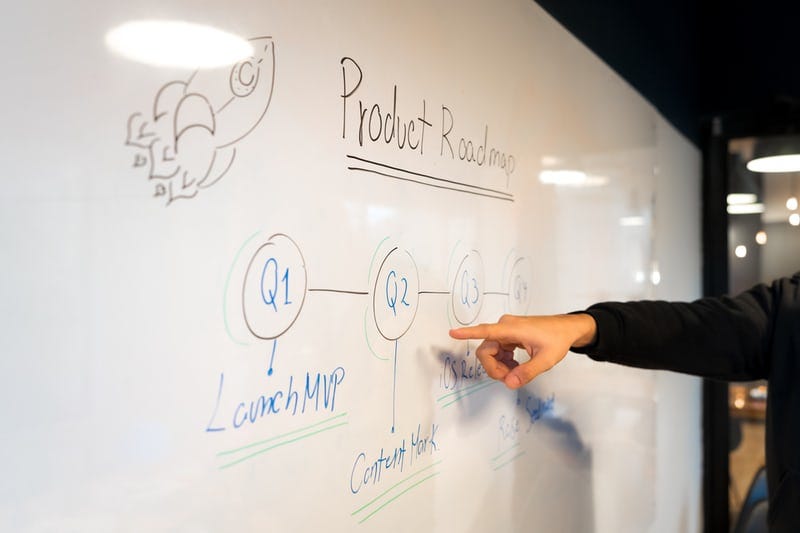
Side Track
Although startups may seem hot, freeing, audacious, and only for too cool for school dropouts, they aren’t as fun or luxurious as one may presume. If we all had the choice, I’m sure most of us would prefer to work for ourselves and manage a public company but sometimes, that long treacherous path will take you off course.
As a college student having worked at multiple startups and having built one from scratch during the pandemic, following my immigrant family’s footsteps has certainly helped me get used to the unknowns and trial and error experimentation process of startup building. Wearing multiple hats is part of the game and has taught me startup life is certainly one of the hardest yet most rewarding career paths.
Startup growth and entrepreneurialism are economic indicators that reveal the strength of the economy and resilience of the country’s citizens. The U.S. relies on its immigrants for its growth, power, and status. IPO debuts correlated with an increase in job openings and lowered unemployment. They were forward-looking indicators to help the economy recover in 2021.
The U.S. has the most startups and entrepreneurs which have accelerated economic growth, liquidity in capital markets, and jobs but also negatively exacerbated the wealth and income inequality gap. With frothy lofty valuations for companies that are trading at sometimes at a hundred times earnings, it is alarming and unfair to find out your CEO is paid 200x more than you.
The power of the financial system is relentless – only growing larger and serving more customers such as the unbanked and younger generations each year. Investors’ have utilized more capital than ever before betting on the future and you can be a part of it.
Entrepreneurs will always be needed as we need a more productive, efficient, and streamlined economy able to rebound from future recessions. Pandemic-proof stocks have allowed us to stay connected and hopefully mentally sane during these unprecedented times. We must thank all entrepreneurs for saving and or helping us get through these challenging times. After all, the CEOs of the major pharmaceutical companies that produced the vaccine, most notably, Pfizer and Moderna are immigrants.
If you’re stipulating or struck by an idea, realize the hardest part is starting. If you have a hobby that has been a way to relieve boredom or stress, push it forward. Most past times become ventures anyways. It just requires 1 good idea. No day is guaranteed. See what you are capable of and make sure above all, you have a steady reliable income source while starting the venture on the side to confirm it can become your new reality. You don’t want to go backward or worse of all, leave the U.S.
Some say if the pandemic didn’t happen, their startup and ventures wouldn’t have been born. 2020–2021 was a blessing in disguise for many people, myself included. I would have never been writing or been curious about personal finance without this extra free time. Remote school put an extra 30 hours into my week! I’m certainly not the best writer. I make thousands of mistakes but I also have learned and enjoyed this process the most. This is the first hobby I’ve found that is actually educational besides reading. As some say, the best recipe for a startup is uncertainty and the pandemic was full of it.

